The University of Chicago Press, Chicago 60637
The University of Chicago Press, Ltd., London
2022 by Robin Waterfield
All rights reserved. No part of this book may be used or reproduced in any manner whatsoever without written permission, except in the case of brief quotations in critical articles and reviews. For more information, contact the University of Chicago Press, 1427 E. 60th St., Chicago, IL 60637.
Published 2022
Printed in the United States of America
31 30 29 28 27 26 25 24 23 22 1 2 3 4 5
ISBN-13: 978-0-226-76933-2 (cloth)
ISBN-13: 978-0-226-76947-9 (paper)
ISBN-13: 978-0-226-76950-9 (e-book)
DOI: https://doi.org/10.7208/chicago/9780226769509.001.0001
Library of Congress Cataloging-in-Publication Data
Names: Epictetus, author. | Waterfield, Robin, 1952, editor, translator.
Title: The complete works : handbook, discourses, and fragments / Epictetus ; edited and translated with introduction and notes by Robin Waterfield.
Other titles: Works. English. 2022
Description: Chicago : University of Chicago Press, 2022. | Includes bibliographical references and index.
Identifiers: LCCN 2022008960 | ISBN 9780226769332 (cloth) | ISBN 9780226769479 (paperback) | ISBN 9780226769509 (ebook)
Subjects: LCSH: Philosophy, AncientEarly works to 1800.
Classification: LCC B560.E5 W38 2022 | DDC 180dc23/eng/20220304
LC record available at https://lccn.loc.gov/2022008960
 This paper meets the requirements of ANSI/NISO Z39.48-1992 (Permanence of Paper).
This paper meets the requirements of ANSI/NISO Z39.48-1992 (Permanence of Paper).
EPICTETUS
The Complete Works
HANDBOOK, DISCOURSES, AND FRAGMENTS
Edited and translated with introduction and notes by ROBIN WATERFIELD
THE UNIVERSITY OF CHICAGO PRESS
CHICAGO AND LONDON

A medieval illustration of a fictitious work, written sometime between the third and ninth centuries, entitled The Dialogue between the Emperor Hadrian and the Philosopher Epictetus. Note the philosophers typically unkempt appearance.
Photo Bodleian Libraries, University of Oxford
In memoriam WGD
Contents
Preface
It has been a great pleasure to work once again with Susan Bielstein and James Whitman Toftness (and then Dylan Montanari) at the University of Chicago Press, and it was also a pleasure to have the typescript assigned to a skillful copy editor, Lori Meek Schuldt. I received useful advice and suggestions from the readers who assessed the book proposal and the finished draft. Tony Long, the doyen of Epictetus studies and even of Stoic studies as a whole, was kind enough to act as one of the final readers, and I am particularly grateful to him for making me focus on the issue I address in the Note on the Translation. Charles Brittain also read the final draft of the book and gave me an extremely helpful and detailed report. Many improvements were made in the light of his comments.
This book was written under covid-19 restrictions. It is in any case my usual practice when writing a book to ask friends and colleagues to send me offprints of articles of theirs that are unavailable in the online archives, but, denied access to libraries, it was especially important this time. I am particularly grateful to thoseBrad Inwood, John Sellars, Ron Polanskywho sent me copies from their collections of articles written by others who were unavailable. William Stephens supplied a whole book (his translation of Bonhffers 1894 Die Ethik des stoikers Epictet), and I should also thank the publisher, Peter Lang, for letting me see an advance copy of the 2021 revised edition of the book. Alexander Meeuss generosity extended to making material available to me from his university library at Mannheim. In the process of translating, I consulted Radcliffe G. Edmonds III on incantations, David Martinez on puzzling ethical datives, and Bill Murray on how to capsize a boat; I thank them for their help.
Note on the Translation
I have translated the following texts. For the Handbook: G. Boter, Epictetus: Encheiridion (Teubner, 2007); for Discourses: J. Souilh and A. Jagu, pictte, Entretiens, 4 vols. (Bud, 1945, 1949, 1963, 1965); for the fragments: W. Oldfather, Epictetus: The Discourses as Reported by Arrian, The Manual, and Fragments, 2 vols. (Loeb, 1928). These are the most recent available editions, but for Discourses I have also had on hand H. Schenkls ground-breaking, but out-of-print Epicteti Dissertationes ab Arriano Digestae, 2nd ed. (Teubner, 1916). However, there are many places where I differ from the readings of these editors; they are marked in the translations by an obelisk, or dagger (), which points to a note in the Textual Notes (). The notes (and the introduction) are designed more for students and lay readers than professionals in ancient philosophy.
The translation that I consulted most is the one by R. Hard: Epictetus: Discourses, Fragments, Handbook, with introduction and notes by C. Gill (Oxford University Press, 2014).
My policy, as in all my translations, has been to try to combine accuracy with current English fluency and readability. In one important respect, however, I have not followed current English practice: I have not gender-neutralized Epictetuss pronouns. Epictetus often talks about or addresses an anonymous he, who is either a fictional person acting as a foil or one of his visitors or students, who appear to have all been male. To neutralize this person would have misrepresented Epictetus and his world. He was writing two thousand years ago, at a time when male dominance was simply assumed. Nor was it possible in ancient Greek to write about people (as opposed to things) in a gender-neutral way; in fact, to neutralize their gender in some linguistic fashion was often an insult.
In any case, it is clear that the anonymous he that Epictetus talks about or addresses is meant to be masculine, because the people and creatures to whom he is likened are always masculine. It is not just that he is likened to Heracles and Theseus, for instance, but to people with professions or occupations that in the ancient world were exclusively masculine: wrestlers and other athletes, actors (there were actresses in Rome but not in Greece, and Epictetus assumes Greek culture), orators, soldiers. At one point he is likened to a fighting cock. He can be waylaid by sexual attraction to girls. He can be called a son of God. He goes to the male bathhouse. He stands for office in Rome. So I have largely preserved Epictetuss usage in this respect.

Map of Greece by Andrs Bereznay
Introduction
Four great expositors of Stoicism emerged in Rome in the first and second centuries CE: Seneca the Younger, Gaius Musonius Rufus, Epictetus, and Marcus Aureliusan imperial courtier, a member of the equestrian order, an ex-slave, and an emperor. Despite being men of their time, their voices reach us clearly across the centuries because they speak always to our common humanity and our best aspirations. Since the work of earlier Stoics exists only in fragments, the surviving writings of these men constitute for us by far the most detailed record of Stoic philosophy.
Seneca focused on writing, and his books, plays, and letters were widely disseminated in his lifetime. Musonius Rufus was a popular teacher, and some of his lectures were transcribed by students and published. Marcus wrote for himself, and his private notebooks, known to us as
Next page
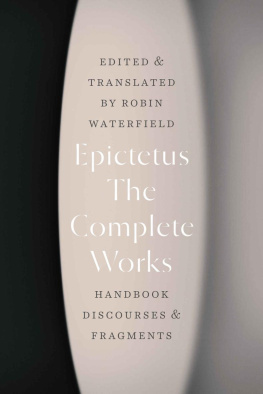
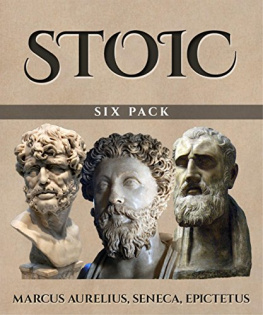
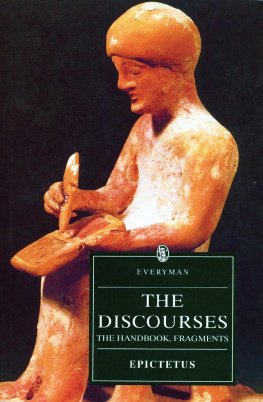
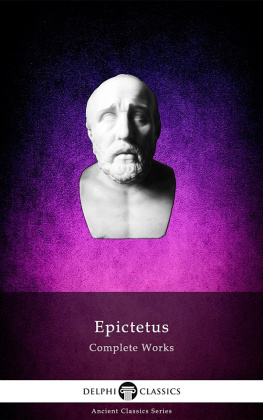
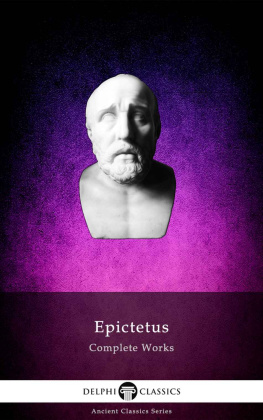

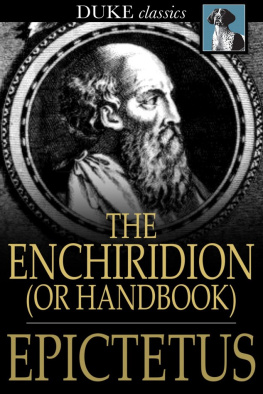
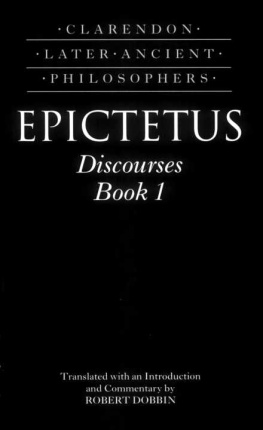
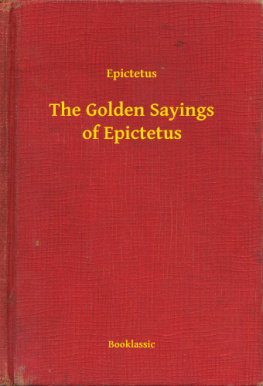
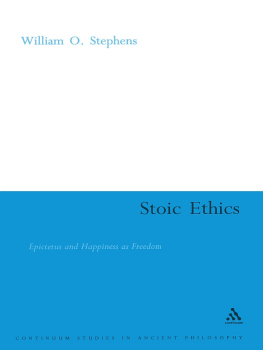
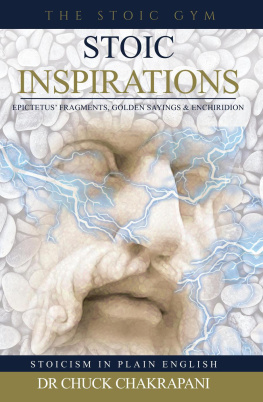
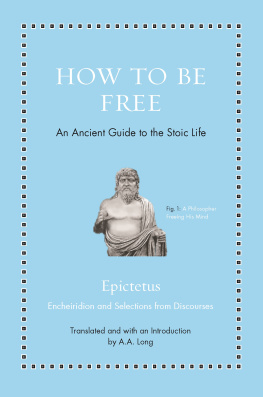

 This paper meets the requirements of ANSI/NISO Z39.48-1992 (Permanence of Paper).
This paper meets the requirements of ANSI/NISO Z39.48-1992 (Permanence of Paper).
